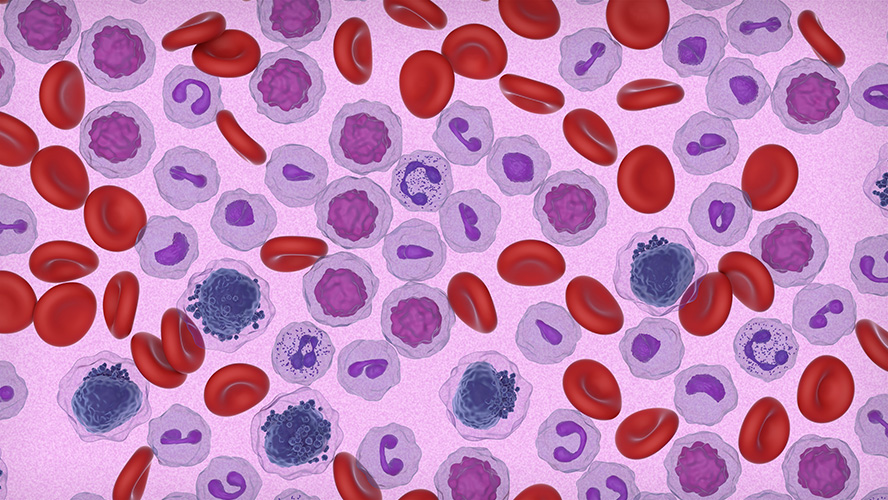
A clinical trial led by Dr. Steven Chan at UHN’s Princess Margaret Cancer Centre (PM) found that patients with relapsed or treatment-resistant acute myeloid leukemia (AML) and a specific gene mutation may benefit from a combination therapy of two drugs: venetoclax and enasidenib.
Acute myeloid leukemia (AML) and myelodysplastic syndromes (MDS) are blood cancers caused by myeloid precursor cells (cells that normally develop into blood cells) that accumulate and fail to mature properly. These diseases often result from genetic mutations, such as in the IDH2 (isocitrate dehydrogenase 2) gene. Mutations in IDH2 block the ability of cells to develop.
Enasidenib, a drug that targets mutant IDH2, is used to treat cases of AML with this mutation. Although enasidenib has shown promising results in clinical trials for patients with relapsed or treatment-resistant AML and MDS, more effective therapies are still needed.
Previous studies from Dr. Chan’s lab have shown that enasidenib may work well with another drug called venetoclax—an inhibitor of a protein that helps cancer cells survive. Preclinical studies showed that a combination of enasidenib and venetoclax was more effective than either drug alone.
Dr. Chan’s team investigated how safe and effective the two drugs are together in patients with relapsed or hard-to-treat IDH2-mutated AML or MDS in a clinical trial, called ENAVEN-AML. They enrolled 27 patients with IDH2 mutations across two Canadian centres, including Princess Margaret and the University of Alberta Hospital.
Results showed that enasidenib and venetoclax were safe and active in these patients. “Of the 26 participants with AML, the overall response rate to the combined drug therapy was 62%, with 50% (13 out of 26) having complete remission—almost double the effect of using enasidenib alone, based on data from another clinical trial,” says Dr. Guillaume Richard-Carpentier, first author of the study.
For those who responded to the treatment, the effects lasted a median of 16.6 months, and some patients remained in remission for over two years. As for the safety results from the trial, the combination was well-tolerated, with manageable side effects.
“Because both drugs can be taken orally and they have a good safety record, patients can manage the treatment outside of the hospital. This treatment could serve as an effective bridge to stem cell transplantation for some patients, or as long-term therapy in patients not fit for transplantation,” says Dr. Chan, senior author and Senior Scientist at PM. “We are excited to see such promising results, especially in a population with limited treatment options.”
While more research is needed to confirm these findings and explore the combination in newly diagnosed patients, this study offers hope for a safer, outpatient-friendly treatment option for patients with relapsed or refractory AML.
Dr. Guillaume Richard-Carpentier is a Hematologist and Clinician Investigator at Princess Margaret Cancer Centre and an Assistant Professor in the Department of Medicine at the University of Toronto. He is the first author of the study.
Dr. Steven Chan is an Allan Slaight and Senior Scientist at Princess Margaret Cancer Centre and an Associate Professor in the Department of Medicine at the University of Toronto. He is the corresponding author of the study.
This work was supported by AbbVie, Bristol Myers Squibb, and The Princess Margaret Cancer Foundation.
Dr. Guillaume Richard-Carpentier participated in advisory boards with AbbVie, Taiho, Pfizer, Bristol Myers Squibb, and Astellas; participated in consultancy meetings with Pfizer, Bristol Myers Squibb, and AbbVie; and received honoraria from Pfizer and Astellas. Dr. Steven Chan received research funding from Bristol Myers Squibb/Celgene, AbbVie, Servier, Agios, and AstraZeneca. For a complete list of competing interests, see the manuscript.
Richard-Carpentier G, Gupta G, Koraksic C, Cathelin S, Wang L, Bankar A, Davidson M, Gupta V, Maze D, Minden MD, Murphy T, Schimmer AD, Schuh AC, Sibai H, Yee K, DiNardo CD, Brandwein J, McNamara CJ, Chan SM. Enasidenib plus venetoclax in patients with IDH2-mutated relapsed or refractory acute myeloid leukaemia or myelodysplastic syndrome (ENAVEN-AML): a multicentre, single-arm, phase 1b/2 trial. Lancet Haematol. 2025 Nov;12(11):e887-e897. doi: 10.1016/S2352-3026(25)00254-6. Epub 2025 Oct 8.




